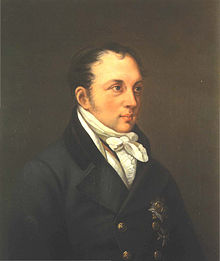Georg von Engelhardt
Georg Reinhold Gustav Baron von Engelhardt ( Russian Егор Антонович Энгельгардт ; born August 1 jul. / 12. August 1775 greg. In Riga , † January 3 jul. / 15. January 1862 greg. In St. Petersburg ) was a Russian teacher and statesman .
Life
Origin and family
Georg was a member of the Baltic barons Engelhardt . His parents were the Russian State Councilor and Livonian General Economics Director Anton Johann von Engelhardt (1729–1808) and Beata Christina, née von Priauda from the Livonian house of Wredenhof (1736–1801).
He married Auguste Marie, née Whitacker, widowed Hahn († 1858) in St. Petersburg in 1800 . The marriage resulted in two daughters and three sons.
In the years 1853/1854 his entire family received the recognition of the right to use the baron title .
Career
Engelhardt moved with his parents to St. Petersburg as a child. His teachers later included well-known academics such as Storch and Krafft .
From 1791 he served in the Imperial Russian Army , first with Prince Potemkin , from 1795 with Prince Subow . In 1796 he was promoted to captain and probably received his farewell as such .
Afterwards he joined the office of the Vice Chancellor Prince Kurakin . As the later secretary of Countess Litta, Engelhardt was responsible for the affairs of the Order of Malta and soon became its master of ceremonies. In 1801 he moved to the Reichsrat as an assistant state secretary.
In 1812 he became director of the Pedagogical Institute in St. Petersburg and was director of the Lyceum in Tsarskoe Selo from 1816 to 1823 . Engelhardt gave this educational institution the decisive influence for a long time. At his own request, he was retired in 1822. He often stayed in close contact with former students.
Engelhardt was a real councilor of state . He was also a member of the school council of the Reformed congregations and was friends with Johannes von Muralt . He was also in correspondence with some Decembrists , among others with Küchelbecker . He also stood up personally before the emperor for Pushkin , who had fallen out of favor in the context.
He was buried in the Smolenska Lutheran cemetery .
Works
- Russian miscelles for a better understanding of Russia and its inhabitants , 4 volumes, St. Petersburg, 1828–1832
- Russian Agricultural Newspaper , 1834-1853 (as editor and publisher)
- Journey along the north coast of Siberia and on the Arctic Ocean , Berlin, 1839 (processing of Ferdinand von Wrangel's travel manuscript )
literature
- Baltic Historical Commission (ed.): Entry on Georg von Engelhardt. In: BBLD - Baltic Biographical Lexicon digital
- Engelhardt, Georg Reinhold . In: Theodor Westrin (Ed.): Nordisk familjebok konversationslexikon och realencyklopedi . 2nd Edition. tape 7 : Egyptologi-Feinschmecker . Nordisk familjeboks förlag, Stockholm 1907, Sp. 543 (Swedish, runeberg.org ).
- Русский биографический словарь , Volume 24, 1912, pp. 253-257 (Russian)
Individual evidence
- ↑ a b Astaf von Transehe-Roseneck (edit.): Genealogical manual of the Baltic knighthoods , part 1, 1: Livonia. Görlitz, 1929, p. 44.
| personal data | |
|---|---|
| SURNAME | Engelhardt, Georg von |
| ALTERNATIVE NAMES | Engelhardt, Georg Reinhold Gustav von (full name); Энгельгардт, Егор Антонович (Russian) |
| BRIEF DESCRIPTION | German-Baltic-Russian educator and statesman |
| DATE OF BIRTH | August 12, 1775 |
| PLACE OF BIRTH | Riga |
| DATE OF DEATH | January 15, 1862 |
| Place of death | St. Petersburg |
